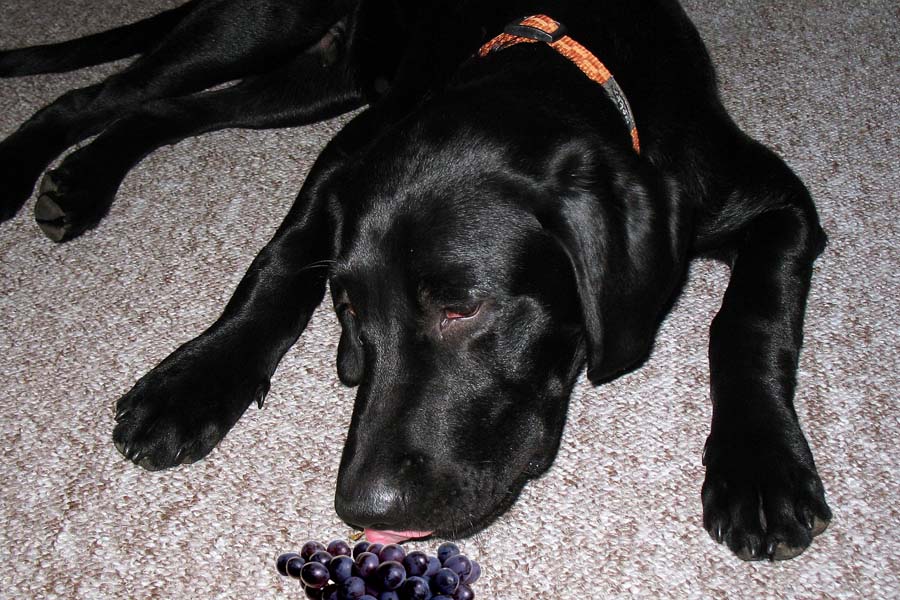A Turramurra Vet Pet Care Article
Beware of Grapes, Sultanas and Raisins!

Beware of Grapes, Sultanas and Raisins!
by Dr Gretta Howard – Senior Veterinarian
During the summer holidays and in particular at Christmas time it’s common for families to enjoy fresh grapes, salads with sultanas or a traditional Christmas pudding. It is important to resist the temptation to feed any of these food items to your pet, as they can be highly toxic to dogs and cats, even in tiny quantities.
It’s only been in the last 20 years that veterinarians have realised that grapes, sultanas and raisins are dangerous to pets. Cats are pretty fussy creatures and generally won’t eat them, so we don’t usually see this toxicity in cats so much. Dogs on the other hand, will happily eat these, or worse still, if given the opportunity, dogs may gobble down chocolate-coated sultanas – 2 toxins in one gulp!
In some dogs, eating just one small serving can result in acute kidney failure, whereas many dogs can tolerate eating a larger amount without harm. The trouble is that it’s impossible to predict which dogs will develop potentially fatal toxic effects from grapes, sultanas and raisins, so until further research emerges in the field of veterinary toxicology, we need to treat all cases of ingestion in a similar manner.
What toxic effects can grapes, sultanas and raisins have on my dog?
Clinical signs of grape, sultana or raisin toxicity include:
- Vomiting
- Diarrhoea
- Poor appetite
- Lethargy
- Abdominal pain
- Inability to product urine
- Death
What should I do if my dog has eaten a grape, sultana or raisin?
Unfortunately, one of the challenges of grape, sultana and raisin toxicosis is that we don’t really know what the minimum toxic dose is. If your dog has eaten a single grape, sultana or raisin, then inducing vomiting and then monitoring renal parameters via a blood test may be sufficient. The challenge is if your dog eats multiple grapes, raisins or sultanas and we cannot determine whether all of them have been brought up in the vomitus. In these cases, we may recommend hospitalisation on intravenous fluids for 48 hours to support the kidneys until we can be certain that your dog is producing urine properly and there are no elevations in the kidney parameters on serial blood tests. If there are no changes to the renal blood parameters within 3 days of ingestion, then it is unlikely that kidney failure will occur.
How is vomiting induced in pets?
Dogs: Your vet will admit your dog for approximately 30-60 mins to induce vomiting via an injection of apomorphine. This is highly successful in inducing vomiting in the majority of dogs and usually works within 10-15 minutes. Once the toxin has been vomited up, an anti-vomiting injection will usually be administered in order to make sure your pet feels better and does not become dehydrated.
Cats: Inducing vomiting in cats is sometimes problematic as unlike dogs, they cannot tolerate the same drug so there are less viable options for cats to induce vomiting successfully. The drugs used for inducing vomiting in cats also tend to cause mild sedation, so cats need to be carefully monitored throughout. The sedation effects can be reversed however. The success rate of inducing vomiting in cats is around 75%.
What if I choose not to hospitalise my pet after grape, sultana or raisin ingestion?
Pet owners may choose not to hospitalise their seemingly healthy pet after vomiting is induced, but unless you know the exact number consumed and can count them in the vomitus, your veterinarian cannot guarantee that all the toxin has been removed. So, it is possible that your dog could still develop kidney failure, even if vomiting is induced. This is a risk some owners choose to take and while resulting kidney failure is seemingly uncommon if vomiting is induced promptly, pet owners need to be aware of this risk.
How do I know if my dog will get sick?
Unlikely chocolate toxicity in pets, there is great variability between individuals in susceptibility to this toxin and it is not possible to predict which individuals will develop kidney failure. So, it’s best to prevent access to these altogether, even in small quantities. If your dog has eaten even just a single grape, raisin or sultana then you will need to make a vet appointment urgently to induce vomiting as there is a narrow window to do this successfully. Prognosis is good following early decontamination but if your dog develops acute kidney failure, prognosis is guarded but a full recovery of kidney function can be achieved through intensive care.
What if I don’t know what time my dog has eaten a grape, sultana or raisin?
Sometimes owners find evidence of toxin ingestion but do not know when their pet ate the toxin. In these instances, it is still important to urgently visit the vet so that a blood test can be run to screen the kidneys for damage. It’s often still worth inducing vomiting as gastric emptying times vary between dogs. If the toxin has already left the stomach, then intestinal absorption can be slowed by activated charcoal treatment. Hospitalisation will usually be recommended for intravenous fluids and serial blood testing to reduce the chance of kidney failure. Your vet can discuss the options with you during the veterinary consultation so that you can make an informed decision about your pet’s care.

